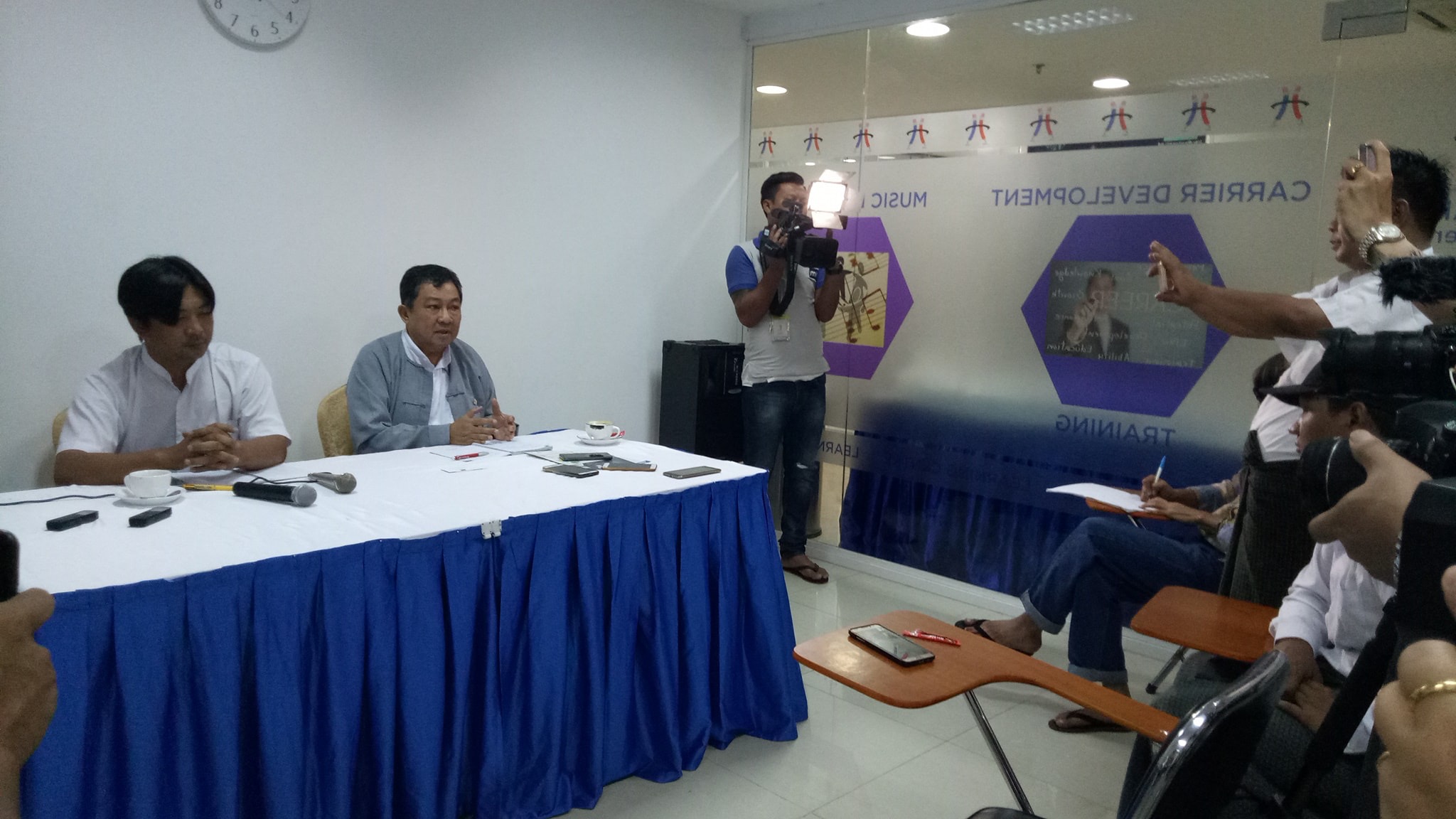YANGON—Myanmar’s trade union and labor organizations voiced strong disagreement with Brussels’ move to consider withdrawing trade preferences at a meeting with EU officials on Monday.
Representatives of the Myanmar Confederation of Trade Unions and the Myanmar Infrastructure, Craft and Service (MICS) organization met with members of an EU delegation looking into the human rights situation in the country at the bloc’s Myanmar office in Yangon.
“We told them we don’t agree with the EU’s [possible] withdrawal of trade preferences,” U Maung Maung, president of the Myanmar Confederation of Trade Unions, said after the meeting.
During the meeting, U Maung Maung stressed that Myanmar’s reforms are making progress, saying, “Myanmar needs the EU’s support for further reforms in the country.”
The joint mission between the European Commission’s trade arm and the EU’s diplomatic service on Monday started their work examining the situation on the ground. The mission’s findings will help the EU decide whether to withdraw Myanmar’s “Everything but Arms” (EBA) status, which allows it to export any goods except weapons to the EU tariff-free.
The EU monitoring mission follows a statement by EU Trade Commissioner Cecilia Malmstrom on Oct. 5 warning that Myanmar could lose its EBA trade privileges over the “violation of human rights” cited in a UN fact-finding mission’s report. Malmstrom said the EU would send an emergency, high-level mission to the country to assess the human rights situation on the ground.

In a recent interview with The Irrawaddy, lawmakers, labor policy makers, Myanmar Garment Manufacturers Association (MGMA) members and rights groups warned that the loss of duty-free export trade preferences could put more than 400,000 jobs at risk and badly damage the country’s economy by depriving it of its largest source of foreign exchange income.
Lawmakers said withdrawal of trade preferences is not the right way to apply pressure over human rights violations against the Rohingya in Rakhine State, as the action would also disrupt the government’s major economic reforms, which have seen the country open up after more than six decades of isolation under military dictatorship.
The EBA scheme is a part of the EU’s Generalized System of Preferences (GSP), which allows full duty-free and quota-free access to the EU’s single market for all products except arms and armaments.
Since 2013, the EU has lifted duties on goods from Myanmar under the EBA’s zero-tariff import regime. Nearly 70 percent of Myanmar’s exports go to EU countries, and more than half of these are garments.
According to the MGMA, the EU has become Myanmar’s largest trade partner for garments, purchasing more than 47 percent of the products, while Japan, the second-largest, purchased just 27 percent of garment products in 2017.
The value of Myanmar’s garment exports to the EU has significantly increased from $1.2 billion in 2013 to $1.5 billion in 2014, $1.7 billion in 2015, $2.1 billion in 2016 and $2.7 billion in 2017, according to the MGMA.
As a result of the opening of the EU market, the number of factory workers in Myanmar has grown from 240,000 in 2012 to 450,000, and the garment sector is the most labor intensive of the country’s major industries.
As of Sept. 30, 2018, according to the MGMA’s records, there were 518 factories in Yangon, Thilawa, Pathein, Hpa-An and Mandalay, supplying European and other international brands like H&M, Inditex, Next, Adidas, Primark and Gap. Yangon is home to about 200 garment factories.
“If they withdraw the trade preferences, production will decline, and so will foreign investment. So, the laborers will become jobless; I told them the EU would bear full responsibility for this outcome,” U Maung Maung said.
In early October, CTUM published an open letter to the EU strongly opposing the withdrawal of trade preferences and pointing out that the move would only harm the country’s social development as it undergoes a transition to democracy.
The EU officials told the trade union and labor organization representatives on Monday that the decision-making process would take months, and promised they would carefully investigate human rights violations, and whether Myanmar had committed labor rights violations and followed international law and regulations.
EBA preferences can be withdrawn “in … exceptional circumstances, [and] in case of serious and systematic violation of principles laid down in fundamental human rights and labor rights conventions,” according to the conditions of the scheme.
During the meeting, MICS vice president U Naw Aung told EU mission officials that Myanmar’s workers had faced rights violations for many years. However, conditions had improved in recent years, he said. “We don’t want to see the current conditions devastated. If the EU withdraws trade preferences, its support for our country’s democratic reform would be fruitless,” he said.
U Naw Aung said he asked the EU officials, “Do you think withdrawal of the trade preferences is the only way to solve the problems in Rakhine and Kachin states?”
According to Myanmar government officials, the EU monitoring mission was to meet at various times on Monday and Tuesday with the minister of commerce; the minister of labor, immigration and population; and the minister of international cooperation, as well as other high-level officials in Naypyitaw.
In June, the EU imposed sanctions against seven senior military, border guard and police officials it said were responsible for or associated with serious human rights violations against the Rohingya population in 2017. The sanctions include an asset freeze and a travel ban.
Last week, Union Minister for International Cooperation U Kyaw Tin held a separate meeting with EU officials during the ASEM leaders’ summit in Brussels. He told them the EU trade preferences provided job opportunities for some 500,000 workers, most of them women.
He stressed that if the workers lost their jobs, more than 1 million people would be negatively affected, including family members who rely on the workers.

















